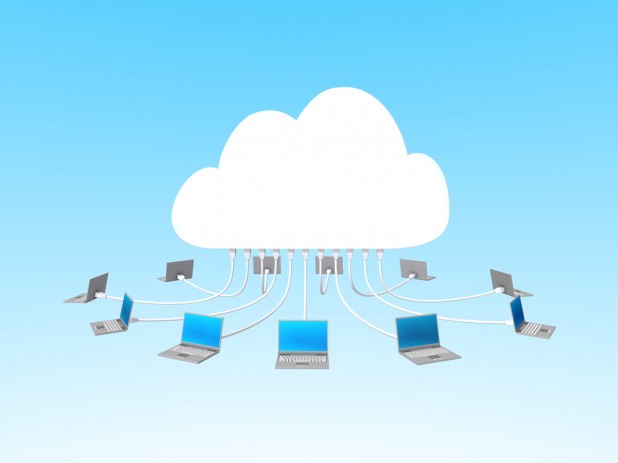The threat of a global pandemic has forced many businesses to adapt by making arrangements for their employees to work from home. However, even before this professional disruption, working remotely had already begun to take hold as a viable option in many industries. With so many people transitioning to working remotely, cloud computing is playing a major role in the way many companies do business. Whether creating a virtual space for meetings, providing remote collaboration tools or reducing the need for hard copy file storage, the benefits of cloud computing while working from home are helping to change the structure of the standard workday experience. Read on to learn more about home based cloud computing and the benefits it provides for your company and your employees.

What is Home Based Cloud Computing?
Home cloud computing is the process of using a remote server to store, manage and access data and applications from home. It allows users to access their files, applications, and other digital content from any device with an internet connection, whether it be a computer, phone, or tablet. Private cloud storage services can also be utilized to store data securely, backing up and safeguarding information in case of emergencies.
A lot of individuals and small businesses use home/private cloud computing to browse, search through files and even work on projects from any device. It’s a great alternative to setting up a server in your house because it eliminates the need for physical storage devices that contain data.
What are the Benefits of Cloud Computing?
Cloud computing is one of the most important technological revolutions in recent history. The cloud has helped companies, organizations, and individuals become more efficient by providing easy access to information from anywhere with an internet connection. This means that you can access your files from any device, whether it be a laptop, tablet, or phone, and get things done on the go. Cloud computing also makes for better collaboration because teams are able to work together online regardless of their location, which improves productivity and efficiency a lot.
The benefits don’t stop there, though, as these technologies provide many other advantages like faster data processing and increased data storage space which leads to higher levels of protection against cyber-attacks such as ransomware attacks and viruses that could otherwise destroy all your data while making them inaccessible forever! Below is an in-depth look at the benefits of cloud computing.
Virtual Storage
In a traditional office setting, computer files are often stored on-site and can only be accessed when employees are in the facility. With employees working from home, cloud computing provides a virtual area to house these documents, allowing access from anywhere they have a solid internet connection. This makes it easy to keep everyone up-to-date on the latest projects and policies, giving employees the information they need when and where they need it.

Collaboration Tools
Depending on which cloud provider a company uses, there are often a variety of collaboration tools available to help employees work together outside the office. Project information can be uploaded into the cloud through user-friendly interfaces, and relevant employees can be added to that particular team. Remote employees will be able to see the same overall expectations for the project and can be assigned particular tasks and deadlines that are unique to their roles.
Ideas can be shared through integrated instant messaging apps, and necessary documents can be uploaded to be accessed by anyone associated with that project. In some of the more robust programs, changes to these documents can be implemented and viewed in real time. All these features work together to mimic an in-house collaboration session that allows everyone’s ideas to be viewed by the rest of the team, who can then provide instant feedback.

Virtual Meeting Space
Another collaboration tool that deserves its own mention is the virtual meeting space. Probably the most recognized of these today is the popular video communication platform Zoom. Virtual meeting spaces, like Zoom, allow the setup of video chat rooms to replace standard, face-to-face meetings. The virtual room is usually run by a host who has control over who can enter the meeting and can control participation by turning the microphones of others on and off when needed. Other participants can see everyone who has a webcam, and computer microphones allow the vocal sharing of ideas.
For some of these programs, companies can even replace large, in-person conferences with a virtual equivalent. This is great for employees of large businesses who are unable to travel to a single meeting place but want to participate in bigger company events. Those who would prefer to keep their faces off camera can also conduct audio conferences, taking the place of standard phone conferences without the need for a landline.

Improved Security
For businesses that use remote employees, data security can be a major concern. Fortunately, cloud computing is a great way to minimize this risk. Cloud servers often offer a much higher level of security than employees are capable of at home. This not only protects sensitive company data from cyber-criminals, but it also protects employees’ work from unexpected loss due to home computing issues by providing a safe place to upload and backup files. This allows employees to easily restore any lost work and continue with their efforts with minimal interruption, keeping them productive and less stressed.

Improvement on Work-Life Balance
Happy employees are productive employees. By utilizing cloud computing, employees not only have access to everything they need from the comfort of their homes, but they also maintain this access anywhere they have a solid internet connection. This gives remote staff the freedom to use their mobile devices in other locations, allowing them to change their environment when needed. A change in scenery can often stimulate creativity while also reducing stress levels, making employees more effective at their jobs, and improving their overall performance.
For some, just the ability to maintain their work efforts at home, giving them the opportunity to spend more quality time with their families by eliminating work commutes and allowing them to enjoy their breaks at home, can provide a significant boost in morale. This can also reflect positively on their efforts.
Whether working from home is a new venture for your business or the company already has experience working with remote employees, home cloud computing is an excellent way to maintain the quality of work you expect at the office as efforts are made from a distance. Having cloud-based solutions or cloud computing services while working from home can keep employees happy, productive, and in the loop, while simulating the same standard office experience proven to get results.

Save Money
The use of cloud-based solutions or cloud computing services can save companies money in the long run. For one, the use of virtual meeting space can replace the need for large, in-person conferences. This not only saves the company on the cost of travel and meeting space but also eliminates the need for employees to purchase audio or video conferencing software. Additionally, by having all company data stored on a secure cloud server, businesses can rest assured that their information is safe from cyber-criminals and unexpected loss. Furthermore, by giving employees the freedom to work from home, companies can eliminate the need for expensive office space and reduce the amount of time employees spend commuting. This not only saves companies money on employee overhead costs but also allows employees to work at their own pace. Unfortunately, the benefits of cloud computing are often overlooked because many do not understand how useful these services can be for both companies and employees.

Is There a Limitation to Cloud Computing?
Home based cloud computing is a model for enabling ubiquitous, convenient, on-demand network access to a shared pool of configurable computing resources (e.g., networks, servers, online storage, applications, and services). Cloud computing and storage solutions provide users and organizations with various capabilities to store and process their data in third-party data centers.
While cloud services have many benefits, it is not without its limitations. One such limitation is that cloud storage can be more expensive than traditional storage solutions. Investing in a private cloud host for your company’s data may appear expensive at first, but it will save time and money in the long run. It might help your organization function more effectively and promote synergy across all divisions, in addition to keeping your data safe. Another thing is relying heavily on the internet to access data from the online cloud storage. Since your information is stored online, you are reliant on the internet being available when you need it, which isn’t always guaranteed to happen, especially in remote or less populated areas.
Despite these limitations, the benefits of home based cloud computing still outweigh its drawbacks. For small and medium businesses, even those with no IT department and limited resources, the cloud is a new way to break into the online market. Cloud computing offers an opportunity for growth without having to invest in server hardware and setup costs. For companies that currently outsource their IT needs, there are options available that allow them to provide information technology support more efficiently.
Using cloud computing for customer relationship management is more of a step forward than an evolution, as it allows companies to think outside the box regarding how they allocate their resources. Information technology has become crucial to business success, but just having hardware isn’t enough anymore.
As enterprises embrace more of these technologies and see the results, cloud computing will become a necessity.
Cloud computing is the future of business. If you’re not using cloud computing solutions in your business yet, now is the time to start. Here at EIRE Systems, the leading IT support services company, we are dedicated to helping you with your cloud-based solutions. Contact us now!
About the Author: EIRE Systems
EIRE Systems is a leading independent provider of professional IT, AV and Access Security services to the financial, insurance, manufacturing, health care, retail, construction, hospitality, commercial real estate, legal, educational and multinational sectors in Japan and throughout the Asia Pacific region. EIRE Systems has expertise across a wide spectrum of Information Technologies, with a track record for successfully completing hundreds of assignments since its establishment in 1996.



